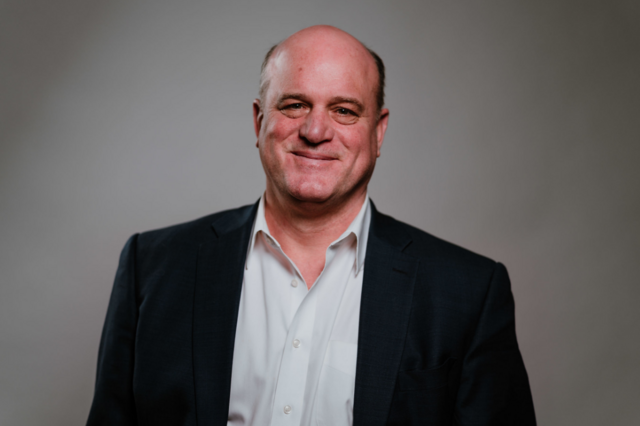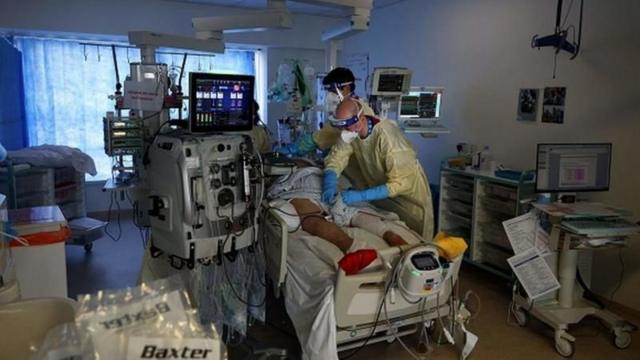
Alessandra Corrêa
From Washington to BBC News Brasil

According to Kerr, for patients the visions seem real, intense, have deep meanings and reduce the fear of dying.
In April 1999, American doctor Christopher Kerr witnessed an episode that would change his professional trajectory.
One of his patients, a 70-year-old woman named Mary, was approaching death , surrounded by her four adult children in the hospital room where Kerr worked.
At one point, Mary sat on the bed and began to move her arms as if she were cradling a baby that only she could see, whom she called "Danny" and seemed to hug and kiss.
The gesture surprised everyone, as they didn't know anyone named Danny.
The pain of the loss was so great that Mary spent the rest of her life without talking about the baby. However, at the time of death, the sight of the son lost so many years ago brought comfort to the patient.
Kerr has already told this story in several interviews and lectures to illustrate how, after a career that began conventionally, with a residency in internal medicine, a specialization in Cardiology and a doctorate in Neurobiology, he decided to change direction and dedicate himself to studying the experiences of patients. terminals.
Today, 25 years after meeting Mary, Kerr is considered one of the world's leading authorities on the study of end-of-life experiences, as the visions and dreams common in terminally ill patients are called.
According to him, these experiences usually begin weeks before death, and increase in frequency as the end approaches.
He says he witnessed people reliving important moments in their lives, seeing and talking to mothers, fathers, children and even pets who died several years earlier.
For patients, the visions seem real, intense, with deep meanings and, commonly, bring a feeling of peace.
"These (relationships) often return in very meaningful and comforting ways, which validate the life that was lived and, in turn, reduce the fear of dying", says Kerr to BBC News Brasil.
Kerr points out that these patients are not confused or incoherent thinking and that, while their physical health declines, they are emotionally and spiritually present. However, many doctors dismiss the phenomenon as hallucinations or the result of confusion, and want evidence.
It was in search of this evidence that Kerr began a pioneering study in the United States in 2010.
Until then, most reports about these experiences came from third parties, but the doctor launched a formal survey, with a scientific approach, in which patients themselves are interviewed and screened to ensure they are not confused.
His research focuses on how often these end-of-life experiences occur, how many days (or weeks) before death, the main themes, what patients feel and the impact of this on families, among other points.
The results have already been published in several scientific articles. The doctor has not yet found a definitive answer to explain these experiences, and says that deciphering the cause is not the main focus of his studies.
“The fact that I cannot explain the origin and the process does not invalidate the experience for the patient”, he states.
According to Kerr, there is still a contrast in how these experiences are valued by patients and their families, but not by doctors in general.
Kerr is CEO of Hospice & Palliative Care, an organization that provides palliative care in Buffalo, New York.
In 2020, he released the book Death Is But a Dream: Finding Hope and Meaning at Life's End ("Death is just a dream: finding hope and meaning at the end of life", in free translation), translated into 10 languages, but still without edition in Portuguese.
In an exclusive interview with BBC News Brasil, he spoke about the meaning of these end-of-life experiences, the main themes involved and how they affect patients and their families.
Read the main excerpts from the interview below.

CREDIT,COURTESY OF CHRISTOPHER KERR
Christopher Kerr is a leading authority on the study of the experiences of people close to death
BBC News Brasil - You began working with terminally ill patients and observing end-of-life experiences in 1999, and since 2010 you have been carrying out scientific research on the topic, collecting and analyzing data. After so many years, what have you learned about these experiences?
Christopher Kerr - I think I [learned] a number of things.
I think the process of dying is obviously more than the physical decline we see. It includes a change in your point of view, in your perceptions, and it includes elements that are actually life-affirming.
The process of dying brings you to a point of reflection, and in a wonderful way, people tend to focus on the things that matter most, on their greatest achievements, which are their relationships.
And, interestingly, these (relationships) often return in very meaningful and comforting ways, which validate the life that was lived and, in turn, lessen the fear of dying.
What we would expect is increasing psychological or psychogenic distress as people face the end of life. But generally, that's not what we see. We see people as if they are enveloped by love and meaning.
So, it's the opposite of what we think. The vision we have of death, the death we anticipate, is not the one we experience.
BBC News Brasil - According to your research, how common are these end-of-life experiences?
Kerr - In our studies, about 88% of people reported at least one [experience]. Our rate is probably higher than is typically reported, because the difference in our study is that we asked [patients] every day.
Dying is a process. When you talk [to patients] on a Monday, you may get a very different response than you would on a Friday. So we ask more often.
What we see is that as patients get closer to death, there is an increase in the frequency of these events.
There is a dramatic increase in the number of people reporting this and the number of times it happens.
BBC News Brasil - And what are the main themes of these visions and dreams?
Kerr - About a third of those interviewed report topics such as travel. Most commonly, they involve people who have loved and lost.
And it's interesting that as you get closer to death, the frequency with which you see these deceased people increases.
And when we looked at what made people feel most comfortable, seeing loved ones dead was what brought them the most comfort.
So, as people get closer to death, they have the feeling of being increasingly comforted.
Another really interesting point is who they dream about. There's a kind of editing process, so they tend to focus on the people who loved and protected them, the people who were most important.
And [that person] can sometimes be one parent but not the other. Or one brother but not the other.
Around 12% of those interviewed described their dreams as neutral or distressing in the questionnaire. But those experiences that were [described as] uncomfortable were some of the most transformative or meaningful.
The idea is that any wounds you have from having lived are often addressed in these experiences.
There are cases like that of a patient who fought in the war and felt guilty about having survived, but in the end he was comforted by seeing his comrades who had died [in combat].
That is, experiences that may not have been entirely comforting were often very meaningful.

CREDIT,GETTY IMAGES
The way people leave us is important: whether it is something cold and impersonal or a moment of reconnection
BBC News Brasil - You say that a common mistake is to think that these patients are delirious. What makes these experiences different from a state of mental confusion?
Kerr - Delirium [an organic syndrome that can be caused by infections or medications and often affects hospitalized elderly people, affecting consciousness and cognition] or states of mental confusion are common, especially at the end of life, but they are very different [from the experiences reported ].
People don't come out of delirium feeling comforted. In general, [experiences with delirium] evoke fear. "There are spiders crawling on my arm, someone is chasing me, there are fires." These are horrible, fleeting experiences that leave patients agitated.
These are patients who are often medicated or tied to the bed. [Experiences with delirium] are not based in reality, nor are they remembered clearly.
On the other hand, patients' end-of-life experiences are based on real people, events, and happenings. They are remembered clearly and are extremely comforting and calming.
People who are confused have fragmented, tangential thoughts, while people experiencing these end-of-life experiences practically have increased acuity, they are perceptive, remembering, feeling. It's completely different.
BBC News Brasil - Sometimes patients are dreaming, but other times they are awake. Are there differences between these two types of experiences?
Kerr - This is something that surprised us. We asked in the questionnaire whether this happened, whether they were dreaming, whether they were asleep or awake, and the answers were half and half.
And we don't know what to make of that, because it's not like you walk into the room and half the time people have their eyes open [while they're going through these experiences].
Dying includes progressive sleep, days and nights become fragmented. And since patients rate the realism [of the experiences] as 10 out of 10 [in the questionnaire], as if it were virtual, we are not sure.
They may be having lucid dreams so that they feel as if they are awake. We really don't know.
But clearly, if we listen to our patients, what they are telling us is that they are not always sleeping.
BBC News Brasil - You also support children with terminal illnesses. What are the differences between the end-of-life experiences of children and adults?
Kerr - Children do it better, because they don't have the filters [that adults have], there is an openness. They do not draw boundaries between the imaginary and the real.
They also have no concepts of mortality, so they live in the moment, they don't think in terms of sequences of events and endings.
What we often see is that they have these experiences in very creative and colorful ways and they seem to intuitively know what it means.
If you haven't known someone who has died, you certainly know pets who have died, and they often come back with the same clarity, alive and healthy.
And children often tell us that [this experience] means to them that they are loved and that they are not alone.
These experiences also seem to tell you where you are. So they are often able to understand their own end through these experiences.
BBC News Brasil - What is the impact of these experiences on the families and people close to the patients?
Kerr - We published two scientific articles about this, with 750 interviews, and it's fascinating. The bottom line is that what is good for the patient is also good for their loved ones.
And the way people leave us matters. Whether we see death as empty and degradation, or whether we see our loved one reconnecting with people he or she loves.
We conducted a very interesting study in which we analyzed the grieving processes. And there are ways to measure that, how people are progressing, whether they can remember [who they lost] in a healthy way, that kind of thing.
And people who witness this kind of end-of-life experience grieve in a much healthier way, because it shapes their perception and their memory of those they have lost. So this is very important.
BBC News Brasil - You have a PhD in Neurobiology, but you say that you cannot explain the origin of these experiences and that understanding this mechanism is not the most important thing. How has your perspective on this topic, as a doctor, evolved?
Kerr - Very humbly. I have witnessed cases where what I was seeing was so profound, and the meaning for the patient was so clear and precise, that I almost felt like an intruder.
And trying to decipher the etiology, the cause, seemed futile. I concluded that it was simply important to have reverence, that the fact that I could not explain the origin and process did not invalidate the experience for the patient.
And then, at some point, instead of standing by the bed asking questions, I learned to sit down and just be more present.
It seemed very small to me to try to medicalize something in which it really wasn't my place to interfere, which was personal in that person's life.
An analogy I often use is that I cannot explain the origin of love [in the same way that I cannot explain the origin of these experiences]. It's something abstract, but we know it exists.
BBC News Brasil - You have already said that the richest discussions about these experiences tend to come from the human sciences, and not from Medicine. Why doesn't Medicine pay more attention to this topic? And, in recent years, have you seen changes in this stance?
Kerr - No. I think it's getting worse.
I think the humanities come into this by questioning our existence and our meaning, there is an openness, whereas in science we look for evidence and things that are concrete, objective and measured. So, it doesn't lend itself to the abstract.
So in Medicine, while we look at the physical process of dying, we don't look at the experience of dying. And that's the biggest difference.
And what is changing is that Medicine is increasingly in love with its science and, as a result, has lost a large part of its art.
BBC News Brazil - His research began because other doctors wanted evidence. But, even after publishing the results in scientific journals, his work drew more attention from the press than from the medical field. How do you see this contrast?
Kerr - It's been a very strange experience for me.
I started [the studies] because I was having difficulty getting young doctors to appreciate what patients were experiencing. So we started collecting evidence, putting it in language they respected.
But when [the research] hit the mainstream media, it was adopted and spread around the world.
And I think there's a problem with that, that people providing medical care don't care [for this topic], while people who are receiving care, or simply curious about their own death, embrace [the study of this topic]. The contrast is interesting.
BBC News Brasil - I know you've said a few times that you hate this question, but I need to ask: are you religious? Do you believe in life after death? And have your beliefs changed over the years of working on this topic?
Kerr - Since we started [the studies], we have always been very disciplined not to interpret [these experiences] beyond death.
Because what we wanted to do was not interpret, it was simply consider the process of dying, face it as a mystery in itself, honor the patient's words and experience, without trying to describe or discover or editorialize what it was.
We were trying to be as objective as possible. Death is like a door, right? And there is a keyhole. You can look and see things in many different ways.
So we were really very disciplined about not interpreting.
But that being said, no, I wouldn't say I was religious. But I certainly approach all of this with openness and respect, I hope.
I think after all these years, 25 years, what I feel is that there is a better story out there. And I don't know what it is, but I have so much respect for what these people are experiencing that it makes me hopeful for something more.
And there are some things [that became clear]. One is that we never truly lose the people we love, they continue to exist for us, not just in ways that are distant, in photographs or remembered in memory, but in presence.
I've seen 95-year-old men who lost their mother at the age of five and, nine decades later, she's there, he hears her voice, smells her perfume.
So you end up feeling like there is something more. That death and dying cannot be defined as something empty.
